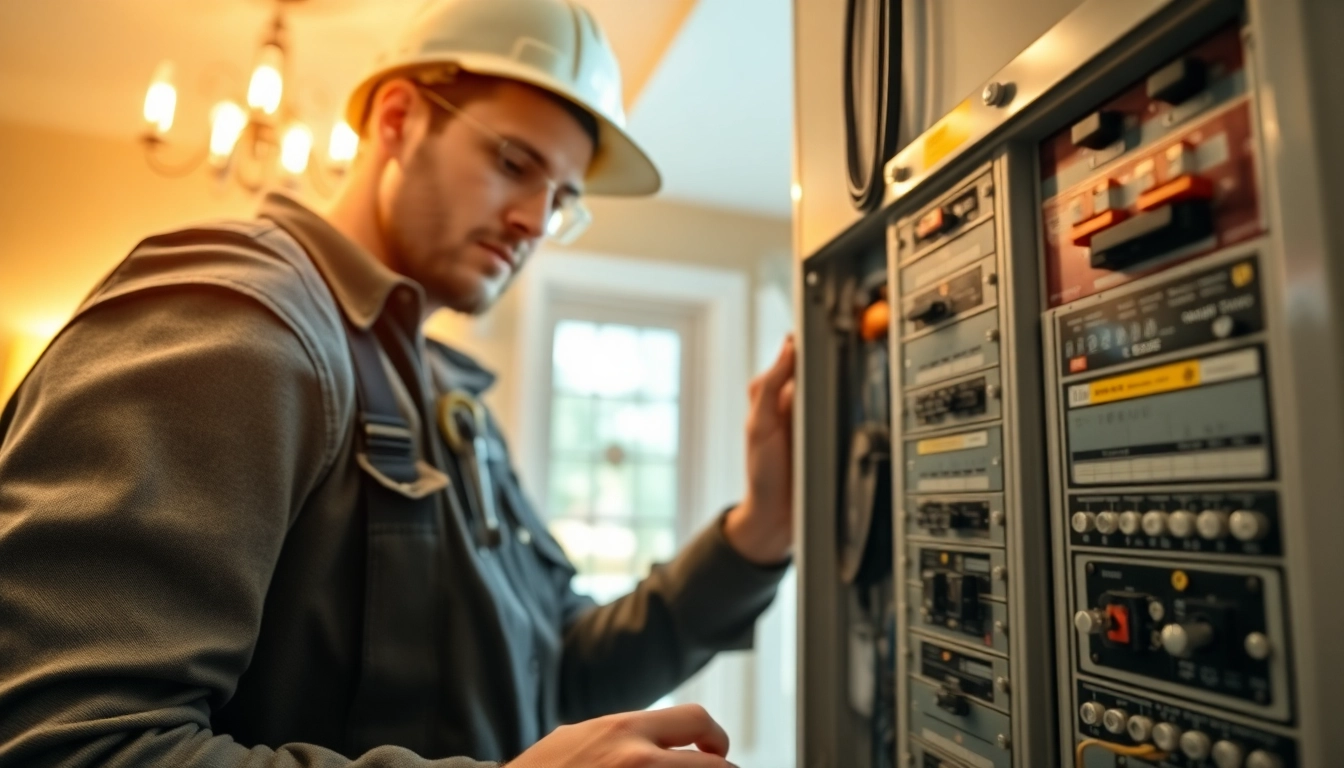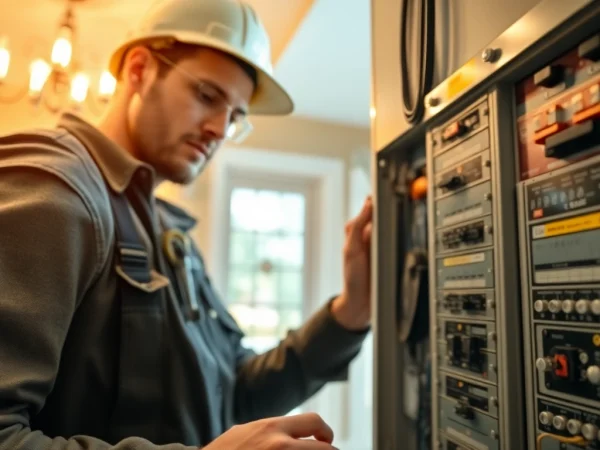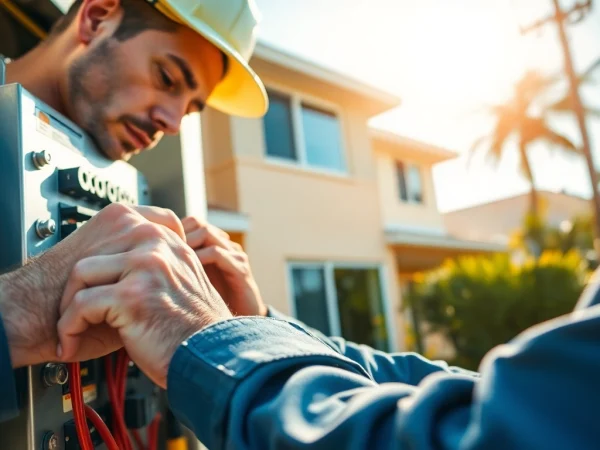Essential Guide to Electrical Panel Clearwater: Upgrades, Benefits, and Considerations
Understanding Electrical Panel Clearwater
An electrical panel, often referred to as a service panel or breaker box, is the hub of your home’s electrical system. It distributes electricity from the utility company to various circuits throughout your home, ensuring safe and efficient power usage. In Clearwater, knowing about your electrical panel can save you from potential hazards and ensure optimal performance, especially as your household’s power demands evolve. To better understand when to upgrade your electrical panel, visit this informative guide on Electrical Panel Clearwater.
What is an Electrical Panel?
An electrical panel serves as the interface between the electricity supplied by your utility provider and your home’s wiring. Comprising multiple circuit breakers or fuses, the electrical panel regulates and distributes electrical current to different parts of your home, from your kitchen appliances to lighting fixtures. Typically located in a basement, garage, or utility room, these panels play a crucial role in ensuring that electrical circuits operate safely and correctly.
Importance of Electrical Panels in Homes
The importance of an electrical panel cannot be overstated as it not only helps manage electricity usage but also significantly impacts safety and functionality. A properly functioning electrical panel protects your home from electrical overloads, prevents fires, and ensures that all your electrical devices receive the power they need.
In older homes, electrical panels may be insufficient for modern power demands, especially with the rise of technology and electrical devices requiring higher amperage. Upgrading to a more modern panel can enhance safety and efficiency, allowing homeowners to use multiple devices without worrying about overloading the system.
Key Components of Electrical Panels
Understanding the key components of an electrical panel can help you maintain and troubleshoot your home’s electrical system:
- Main Breaker: Acts as a safety switch that controls the power supply to the entire panel. When too much power flows through, the main breaker trips to prevent damage.
- Circuit Breakers: These protect individual circuits by automatically shutting off power in case of overloads or faults.
- Bus Bars: Conduct electricity from the main breaker to the circuits via the circuit breakers.
- Grounding System: Provides a safe path for electricity to travel back to the ground in case of a fault, reducing the risk of electric shock or fire.
Signs You Need an Upgrade for Electrical Panel Clearwater
Recognizing the signs that indicate an electrical panel upgrade is necessary can help prevent safety hazards and improve electrical efficiency.
Frequent Circuit Breaker Trips
If you find yourself frequently resetting circuit breakers or replacing blown fuses, it may signal an inadequacy in your current panel to handle your home’s power demands. This could be due to increased electrical usage from new appliances, or wear and tear resulting from an older panel nearing the end of its lifespan.
Inadequate Power Supply
Modern households often have a variety of electrical devices that demand higher power supply. If your home has seen recent installation of high-wattage appliances or renovations that incorporate technology, a panel rated for lower amperage may not suffice. In such cases, upgrading to a panel that can handle greater loads becomes essential.
Age of the Current Panel
The age of your electrical panel plays a significant role in its performance and safety. Panels manufactured over 20 years ago may not meet current electrical standards and regulations. As technology and electrical codes evolve, older panels may become inefficient, present hazards, and fail to provide the necessary support for modern appliances. An aging panel requires careful evaluation, and replacement may be the prudent choice.
Benefits of Upgrading Your Electrical Panel Clearwater
Upgrading your electrical panel provides several benefits that enhance the safety, efficiency, and functionality of your home’s electrical system.
Enhanced Safety Features
Newer electrical panels come equipped with advanced safety features that can mitigate risks associated with electrical fires or shocks. These safety enhancements may include better surge protection, which helps shield your electronics from voltage spikes, and ground fault circuit interrupters (GFCIs) that protect against electrocution in wet areas like kitchens and bathrooms.
Increased Energy Efficiency
Older panels may distribute electricity inefficiently, leading to wasted energy and higher utility bills. Upgrading your electrical panel allows for better management and distribution of electricity, which can improve energy efficiency. Additionally, many newer panels enable smart technology integration, allowing for real-time monitoring and controlling of your energy usage.
Support for Modern Electrical Demands
As households increasingly rely on technology, a robust and adequately sized electrical panel is vital. An upgraded panel can support high-demand electrical devices such as electric vehicles, HVAC systems, and large kitchen appliances, enabling multiple devices to operate simultaneously without risk of overload.
Best Practices for Electrical Panel Upgrade in Clearwater
When considering an upgrade to your electrical panel, following best practices ensures the process is safe, efficient, and compliant with local regulations.
Consulting a Licensed Electrician
Always consult a licensed electrician when planning an electrical panel upgrade. Their expertise will help identify your specific needs based on your household’s power requirements and local electrical codes. An electrician can also ensure the installation is performed safely, following all regulations and best practices.
Understanding Local Electrical Codes
Local electrical codes dictate requirements for electrical installations to ensure safety and efficiency. It’s crucial to understand these codes when upgrading your electrical panel to avoid penalties and ensure compliance. A licensed electrician will navigate these regulations and help you choose the right panel that meets the latest standards.
Choosing the Right Panel and Components
Not all panels are created equal; selecting the right one varies depending on factors such as your home’s size, the number of circuits, and future electrical needs. Consider investing in a panel that offers expansion capabilities, allowing for future upgrades without complete replacements. Discussing options with a professional electrician will help tailor the panel choice to your specific conditions.
Maintaining Your Electrical Panel Clearwater
Regular maintenance of your electrical panel extends its lifespan, ensures safe operations, and enhances reliability.
Regular Inspections and Maintenance
Routine inspections allow you to catch potential problems before they escalate into costly repairs. An electrician can inspect the panel for signs of corrosion, wear, or other issues that could affect performance. Annual or biannual inspections are generally recommended, especially for older panels.
Signs of Wear and Tear
Watch for visible signs like rust, buzzing sounds from the panel, or flickering lights. These symptoms may indicate a deteriorating panel or faulty wiring. Reacting to these signs promptly will keep your panel functioning optimally and help mitigate safety hazards.
When to Call a Professional for Repairs
When in doubt about the condition of your electrical panel, it is prudent to consult a professional. If you experience issues such as recurring breaker trips, an electrical odor, or warm spots on the panel, these warrant immediate attention from a licensed electrician. Taking proactive measures ensures safety and prolongs the life of your electrical system.










